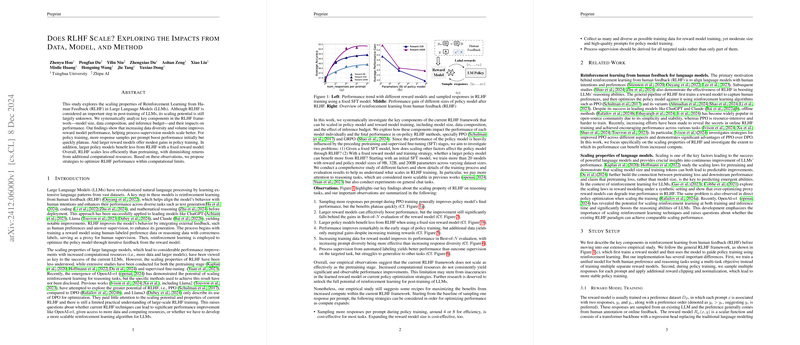Exploring the Scaling Dimensions of Reinforcement Learning from Human Feedback in LLMs
This paper investigates the scaling potential of Reinforcement Learning from Human Feedback (RLHF) in LLMs by examining various critical components including data, model size, and the training method. Despite RLHF's vital role in aligning model behavior with human preferences in LLMs, its scalability remains poorly understood compared to stages like pretraining or supervised fine-tuning. This paper conducts extensive empirical evaluations to assess how different factors influence RLHF's scalability and efficacy, particularly focusing on reasoning and general tasks.
Key Findings and Observations
Several core findings emerge from the paper, each elucidating the scaling characteristics and limits of current RLHF frameworks:
- Data and Sampling Strategies: Increasing the diversity and volume of training data notably improves reward model performance but does not uniformly augment policy model efficacy. Particularly, sampling more responses per prompt during training enhances policy performance significantly at first, but the benefits plateau rapidly after a certain threshold is reached.
- Model Size: Larger reward models yield modest gains in policy model performance, especially for reasoning tasks. However, larger policy models derive less benefit from RLHF when using a fixed-size reward model, suggesting a diminishing return as model size increases.
- Training Algorithms: While using variants of Proximal Policy Optimization (PPO) such as GRPO can offer stable training performance, the choice of reinforcement learning algorithm does not result in dramatically different final outcomes across different models and sampling strategies.
- Reward Model Diversity: Expanding the diversity of training prompts enhances reward model performance more effectively than simply increasing the number of responses per prompt. Similarly, process supervision, which focuses on intermediate task steps, can significantly impact task-specific outcomes but struggles with task generalization.
Implications and Future Directions
The paper underscores critical limitations of the current RLHF paradigm, notably the challenges in leveraging additional computational resources and data for consistent performance improvements. This constraint suggests potential inaccuracies in the reward models or inefficiencies in current policy optimization strategies needing further refinement. Despite these challenges, practical recommendations to optimize RLHF within existing computational budgets are proposed, such as moderate response sampling and expanding reward model sizes.
Future research must prioritize developing more scalable RLHF techniques and investigating innovative approaches to reward modeling and policy training that can yield significant improvements. The limitations observed point to a need for more robust frameworks that can capitalize on increased compute and data scales effectively, potentially unlocking new frontiers in LLM post-training via RLHF.
This paper provides a comprehensive roadmap for enhancing RLHF frameworks, offering valuable insights into the scaling mechanisms within LLMs while highlighting the indispensable role of refinement and novel methodologies in realizing RLHF's full potential.
